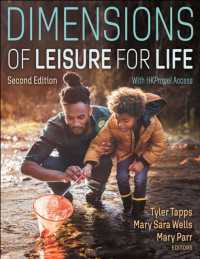- ホーム
- > 洋書
- > 英文書
- > Computer / General
Full Description
This book constitutes the refereed proceedings of the 21st International Conference on Intelligent Tutoring Systems, ITS 2025, held in Alexandroupolis, Greece, during June 2-6, 2025.
The 21 full papers, 27 short papers and 5 posters included in this book were carefully reviewed and selected from 67 submissions. The papers are organized in the following topical conference tracks:
Part I: Generative Tutoring Systems. The goal of this part is to show how new techniques inspired by artificial intelligence (AI) and new methods in education can improve learning, teaching, and generate the capacity for knowledge acquisition and much more.
Part II: Application areas, environments, and techniques for AI systems. This part shows the progress of research investigating the different application areas (such as education, health), techniques (such as neural networks, data mining, natural language processing) and environments (such as games, virtual reality, cognitive robots) for effective AI systems.
Contents
.- Generative systems in Healthcare Informatics.
.- Efficient Attention-Guided CNN for Alzheimer's Disease Prediction.
.- LLMs for Question-Answer & Synthetic Data Generation and Evaluation.
.- Assessing the Potential of AI-Generated Assessments in Medical Education: A Study on Diagnostic Microbiology Using Copilot and Gemini.
.- Generative Systems in Human Computer Interaction, Games and Virtual Reality.
.- Impact of Experience on Cognitive Load and Physiological Responses in Aviation Pilots.
.- Virtual Reality Application for Enhanced Cognitive Rehabilitation and Occupational Therapy.
.- Neural Networks and Data Mining.
.- Automatic Piecewise Linear Regression for Predicting Student Learning Satisfaction.
.- Counterfactual Fairness Evaluation of Machine Learning Models on Educational Datasets.
.- Performance of Neural Networks for Recognizing Images of UML Class, Sequence and State Diagrams.
.- Multidisciplinary educational assessment model using genetic algorithms.
.- Model Decomposition of Multi-dimensional Workflows to Petri Nets for Well-handledness Verification.
.- Two-Level Imbalance Mitigation (TLIM): A Dual-Strategy Approach for Multi-Class Error Classification in Programming Education.
.- Advanced Machine Learning and Data Mining Techniques for Fault Diagnosis in Industrial Applications.
.- Neuromorphic Knowledge Representation: SNN-Based Relational Inference and Explainability in Knowledge Graphs.
.- Generative Systems and Metaverse.
.- Gamified Team Programming in MUVEs: Effects on Student Engagement and Achievement.
.- Heat of the Moment: Exploring the Influence of Stress and Workload on Facial Temperature Dynamics.
.- Security, Privacy, and Ethics in Generative Systems.
.- Person identification with arrhythmic and normal ECG signals using hybrid machine learning and deep learning models.
.- Generative Systems for Applied Natural Language Processing.
.- LLaVA-Docent-V2: Improving Data Quality to Train Large Multimodal Models for Art Appreciation Education.
.- Multi-Domain Evaluation of Auto-Paraphrase Generation at Paragraph-Level: Insights for Education and Plagiarism Detection.
.- Towards a Smarter Homophone Correction Tool: A Case Study in Khmer Writing.
.- ES-KT-24: A Multimodal Knowledge Tracing Benchmark Dataset with Educational Game Playing Video and Synthetic Text Generation.
.- A Predictive Model for Story Points leveraging features like readability and sentiment from User Story description.
.- Generative Systems for Autonomous Robots and Learning.
.- Echo-Teddy: Preliminary Design and Development of Large Language Model-based Social Robot for Autistic Students.
.- Humanized TASC: Tag-less and automated stock counting in smart warehouses.
.- Real-Time Adaptive Navigation for AVs via Hybrid Deep Learning.



![Gesichtserkennung (Sachbuch [bis Frühjahr 2005 Allgemeines Programm])](../images/goods/../parts/goods-list/no-phooto.jpg)




